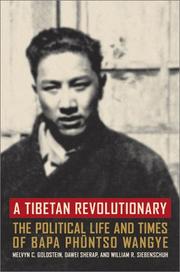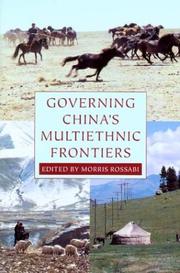| Listing 1 - 2 of 2 |
Sort by
|

ISBN: 0520240898 9780520249929 0520249925 Year: 2004 Publisher: Berkeley University of California press
Abstract | Keywords | Export | Availability | Bookmark
 Loading...
Loading...Choose an application
- Reference Manager
- EndNote
- RefWorks (Direct export to RefWorks)
This is the as-told-to political autobiography of Phuntso Wangye (Phunwang), one of the most important Tibetan revolutionary figures of the twentieth century. Phunwang began his activism in school, where he founded a secret Tibetan Communist Party. He was expelled in 1940, and for the next nine years he worked to organize a guerrilla uprising against the Chinese who controlled his homeland. In 1949, he merged his Tibetan Communist Party with Mao's Chinese Communist Party. He played an important role in the party's administrative organization in Lhasa and was the translator for the young Dalai Lama during his famous 1954-55 meetings with Mao Zedong. In the 1950s, Phunwang was the highest-ranking Tibetan official within the Communist Party in Tibet. Though he was fluent in Chinese, comfortable with Chinese culture, and devoted to socialism and the Communist Party, Phunwang's deep commitment to the welfare of Tibetans made him suspect to powerful Han colleagues. In 1958 he was secretly detained three years later, he was imprisoned in solitary confinement in Beijing's equivalent of the Bastille for the next eighteen years. Informed by vivid firsthand accounts of the relations between the Dalai Lama, the Nationalist Chinese government, and the People's Republic of China, this absorbing chronicle illuminates one of the world's most tragic and dangerous ethnic conflicts at the same time that it relates the fascinating details of a stormy life spent in the quest for a new Tibet.
Phun-tshogs-dbaṅ-rgyal, Sgo-ra-naṅ-pa. --- Tibet (China) --- History --- Autonomy and independence movements. --- Politics and government --- S24/0580 --- S24/0500 --- Tibet--Biographies --- Tibet--History (incl. Relations with China and England) --- Phun-tshogs-dbaṅ-rgyal, --- Tibet Autonomous Region (China) --- Tibetan Autonomous Region (China) --- Hsi-tsang tzu chih chʻü (China) --- Xizang Zizhiqu (China) --- 西藏自治区 (China) --- Hsi-tsang tzu chih chʻü jen min cheng fu (China) --- Xizang Zizhiqu ren min zheng fu (China) --- TAR --- Xizang Autonomous Region (China) --- Bod Raṅ-skyoṅ-ljoṅs (China) --- Bod (China) --- Sitsang (China) --- Thibet (China) --- Tibet-Chamdo (China) --- Tübüt (China) --- Xizang (China) --- Tibet --- TAR (China) --- Тибет (China) --- Tu̇vd (China) --- Tȯvȯd (China) --- 西藏 (China) --- Phüntso, Wangye

ISBN: 029580405X 9780295804057 0295983906 9780295983905 9780295984124 0295984120 Year: 2004 Publisher: University of Washington Press
Abstract | Keywords | Export | Availability | Bookmark
 Loading...
Loading...Choose an application
- Reference Manager
- EndNote
- RefWorks (Direct export to RefWorks)
Upon coming to power in 1949, the Chinese Communist government proclaimed that its stance toward ethnic minorities--who comprise approximatelyeight percent of China’s population--differed from that of previous regimes and that it would help preserve the linguistic and cultural heritage of the fifty-five official "minority nationalities." However, minority culture suffered widespread destruction in the early decades of the People’s Republic of China, and minority areas still lag far behind Han (majority) areas economically.Since the mid-1990s, both domestic and foreign developments have refocused government attention on the inhabitants of China’s minority regions, their relationship to the Chinese state, and their foreign ties. Intense economic development of and Han settlement in China’s remote minority regions threaten to displace indigenous populations, post-Soviet establishment of independent countries composed mainly of Muslim and Turkic-speaking peoples presents questions for related groups in China, freedom of Mongolia from Soviet control raises the specter of a pan-Mongolian movement encompassing Chinese Mongols, and international groups press for a more autonomous or even independent Tibet.In Governing China’s Multiethnic Frontiers, leading scholars examine the Chinese government’s administration of its ethnic minority regions, particularly border areas where ethnicity is at times a volatile issue and where separatist movements are feared. Seven essays focus on the Muslim Hui, multiethnic southwest China, Inner Mongolia, Xinjiang, and Tibet. Together these studies provide an overview of government relations with key minority populations, against which one can view evolving dialogues and disputes.
Minorities --- Government policy --- China --- Ethnic relations --- Political aspects --- Ethnic minorities --- Foreign population --- Minority groups --- Cina --- Kinë --- Cathay --- Chinese National Government --- Chung-kuo kuo min cheng fu --- Republic of China (1912-1949) --- Kuo min cheng fu (China : 1912-1949) --- Chung-hua min kuo (1912-1949) --- Kina (China) --- National Government (1912-1949) --- China (Republic : 1912-1949) --- People's Republic of China --- Chinese People's Republic --- Chung-hua jen min kung ho kuo --- Central People's Government of Communist China --- Chung yang jen min cheng fu --- Chung-hua chung yang jen min kung ho kuo --- Central Government of the People's Republic of China --- Zhonghua Renmin Gongheguo --- Zhong hua ren min gong he guo --- Kitaĭskai︠a︡ Narodnai︠a︡ Respublika --- Činská lidová republika --- RRT --- Republik Rakjat Tiongkok --- KNR --- Kytaĭsʹka Narodna Respublika --- Jumhūriyat al-Ṣīn al-Shaʻbīyah --- RRC --- Kitaĭ --- Kínai Népköztársaság --- Chūka Jinmin Kyōwakoku --- Erets Sin --- Sin --- Sāthāranarat Prachāchon Čhīn --- P.R. China --- PR China --- Chung-kuo --- Zhongguo --- Zhonghuaminguo (1912-1949) --- Zhong guo --- Chine --- République Populaire de Chine --- República Popular China --- Catay --- VR China --- VRChina --- 中國 --- Jhongguó --- Bu̇gu̇de Nayiramdaxu Dundadu Arad Ulus --- Bu̇gu̇de Nayiramdaqu Dumdadu Arad Ulus --- Bu̇gd Naĭramdakh Dundad Ard Uls --- Khi︠a︡tad --- Kitad --- Dumdadu Ulus --- Dumdad Uls --- Думдад Улс --- Kitajska --- 中国 --- 中华人民共和国 --- Persons --- Assimilation (Sociology) --- Discrimination --- Majorities --- Plebiscite --- Race relations --- Segregation --- China (Republic : 1949- ) --- Political aspects. --- S23/0660 --- S24/0500 --- S25/0200 --- S25/0655 --- Mongolia and the Mongols (including Tannu Tuva, Buriats)--Mongolian relations with China --- Tibet--History (incl. Relations with China and England) --- Xinjiang--General works --- Xinjiang--Relations with China --- PRC --- P.R.C. --- BNKhAU --- БНХАУ --- Politics & government
| Listing 1 - 2 of 2 |
Sort by
|

 Search
Search Feedback
Feedback About UniCat
About UniCat  Help
Help News
News